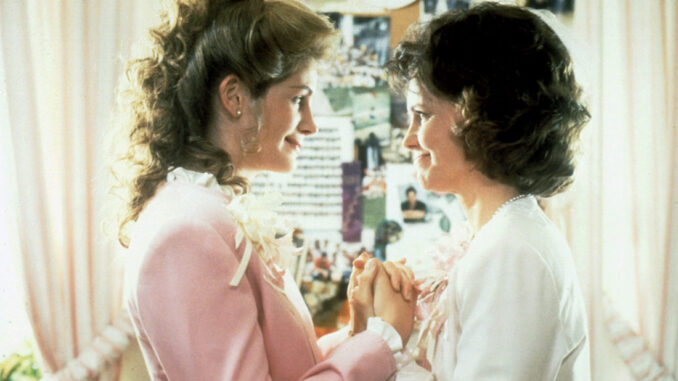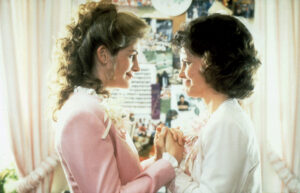
Steel Magnolias Is a Beloved Weepy With a Dark Side
Released 30 years ago, the star-studded melodrama has an uncomfortable message about people who choose to have children despite the medical risks.
Since its release three decades ago, Steel Magnolias has been hailed as a celebration of women. In his 1989 review of the film, Roger Ebert raved about the dialogue and camaraderie of the ensemble, which includes Dolly Parton, Julia Roberts, and Sally Field. “There may be no movie that better epitomizes the bond of female friendship,” HuffPost declared in 2014. “Mothers share the film with their daughters, teen girls turn to it as a sleepover staple, and men of all ages find themselves taken with the tale of six brassy Southern ladies.” Fans of Herbert Ross’s movie, which played on big screens across the U.S. in May and which is being adapted for stage productions this summer, will recall the tragic central plot: A woman with type 1 diabetes, played by Roberts, has a baby despite her doctor’s warnings and dies a few years later. This premise rarely comes up in analyses of the movie’s emotional power—but it should.

Steel Magnolias is based on a true story. The screenwriter Robert Harling’s sister died of diabetic complications after giving birth in the 1980s, shortly before Harling composed the original play and the film script. If the death of Roberts’s character cements the movie’s status as a feel-good weepy, it also places the narrative within an uncomfortable American cinematic tradition—one in which individuals who reproduce against medical advice suffer terrible consequences. Of course, for many viewers, there’s nothing inherently insidious about the film, which doesn’t have the tone of a morality play. But those revisiting Steel Magnolias this year might consider how it fits into a long history of movies with patronizing, outdated, and sometimes eugenicist implications about who should and shouldn’t have children.
